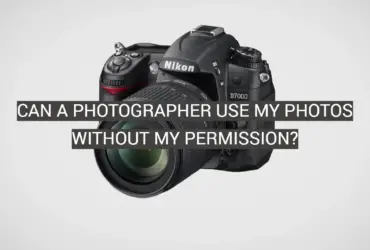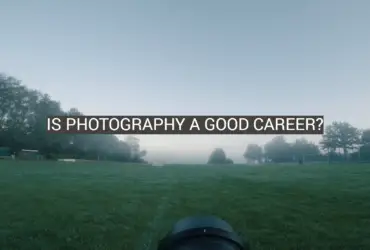Being a photographer can be an incredibly rewarding experience but it’s also rife with challenges. Every day, photographers face obstacles that test their creative and technical skills to the limit. The thrill of capturing just the right shot and the satisfaction of having created something special is often offset by the time, effort and dedication required to produce such pictures. But for those willing to take on these challenges, being a professional photographer can offer some incredible rewards.
What exactly does a Photographer do?
When we think of a photographer, what normally comes to mind is the portrait or landscape shot that they take. However, photographers do so much more than just snapping pictures and capturing memories. A Photographer’s role has expanded over the years to cover many different aspects of image-making.

No matter what kind of photographer you are, your job is all about capturing moments and preserving memories. Through the power of photography, you can bring to life stories that are often overlooked or forgotten.
This is why many photographers consider their craft to be much more than just a job; it’s an art form that they take seriously and strive to perfect day after day. Being creative with composition and subject matter can create images that capture emotion and beauty in unexpected ways.
Photographic artistry is a skill that takes time, patience and dedication to master. With the right blend of technical know-how, creative vision and imagination, photographers can create beautiful works of art that will be remembered forever. It’s an ever-evolving journey for anyone who loves photography; one that is full of discovery and surprises.
Whatever direction your photography journey takes you, the possibilities are endless and only up to you. So remember: never stop learning, never stop exploring and never stop pushing yourself creatively. And before you know it, you will have a portfolio of amazing images that will tell stories for years to come [1]!
How to become a photographer
Ask yourself questions
Before you start your journey as a photographer, it’s important to ask yourself the right questions. What kind of photography do I want to specialize in? How much experience do I need? Do I have the time and resources to commit to this endeavor? Are there any courses or mentors that can help me start out on my journey?
Answering these questions honestly can help you create a good understanding of what it takes to become a professional photographer. It also allows you to set realistic goals and expectations for yourself, so that you don’t get overwhelmed or discouraged on your journey.
Develop required skills through photographer education
Once you’ve identified the type of photography that interests you, it’s time to start developing your skills. There are many different ways to become a successful photographer, and one of them is through formal education.
Many colleges or universities offer courses in photography, focusing on both the technical aspects as well as the creative side of this art form. You can also find online courses or tutorials that can help you get started. Taking the time to learn from experts will give you a better understanding of photography, and it will also show potential employers that you have the necessary knowledge and skills for this field.

Explore different types of photography
There are many different types of photography available to pursue as a professional, such as landscape photography, wedding photography, portrait photography, food photography, and more. Each type of photography requires its own set of skills and knowledge.
It’s important to explore different types of photography to find the one you enjoy and excel in. This will help you focus on your specialty and hone your craft. Don’t be afraid to take risks with new techniques or projects, as this will help you stand out from the crowd and give you a competitive edge.
Buy photography equipment
Once you have a strong understanding of photography and the different types available, it’s time to invest in equipment. Photography can be an expensive hobby, but investing in good-quality gear is essential. The right camera and lens are necessary for capturing great images. Other important items include flashes, stands, backdrops, reflectors, filters, etc.
When buying equipment, it’s important to research and compare prices. Try to find the best deal that meets your needs and budget. There are also many options for renting gear if you don’t have enough money to buy it outright.
Learn camera operation and editing skills
Having the right equipment is just the starting point. To truly excel, you must also master the art of using it. Take the time to learn the fundamentals of camera operation and editing skills, as they will undoubtedly elevate the quality of your photos. Fortunately, there are numerous free resources available online, or you can consider enrolling in photography classes for a more comprehensive learning experience. Additionally, don’t be afraid to experiment with different settings and techniques until you uncover the perfect combination that suits your style and preferences.
While capturing the perfect shot is essential, the editing process should not be overlooked. Learning popular photo editing software like Adobe Photoshop or Lightroom can be a game-changer, allowing you to refine your images and make them truly stand out from the crowd. With these tools at your disposal, you can unleash your creativity and achieve exceptional results that will leave a lasting impression.
Practice taking photos
The most effective approach to becoming a better photographer is to immerse yourself in practice as frequently as possible. Make it a habit to carry your camera wherever you go, always ready to capture anything that catches your eye. Embrace the opportunity to experiment with various techniques, angles, lighting conditions, and editing styles. Don’t forget to take detailed notes, documenting what works and what doesn’t in your photographic endeavors. As you dedicate more time and effort to honing your skills, you will gradually witness remarkable improvements and be able to produce truly breathtaking and awe-inspiring photographs.
Develop a portfolio
Once you’ve honed your skills and feel confident in your photography abilities, it’s time to start building a comprehensive and captivating portfolio that showcases your talent. A well-crafted portfolio is crucial for attracting potential clients and convincing them to hire you for their photography needs.

When creating your portfolio, it’s important to include a diverse selection of your best work or samples from different types of photography. This will demonstrate your versatility and range of styles, allowing potential clients to envision what you’re capable of capturing. Whether it’s stunning landscapes, captivating portraits, or vibrant street photography, show off the breadth of your artistic capabilities.
In addition to showcasing your photographs, your portfolio should also include other supporting materials that can help solidify your professionalism and credibility. Consider including a well-crafted resume that highlights your experience, qualifications, and any relevant certifications. Including references from satisfied clients or professionals in the industry can also help build trust and confidence in your abilities.
Furthermore, don’t underestimate the power of having a professional website and active social media accounts. A website serves as a centralized hub for your portfolio, allowing potential clients to easily browse through your work and learn more about your photography services. Social media platforms, such as Instagram or Facebook, provide additional avenues for exposure, allowing you to reach a wider audience and engage with potential clients on a more personal level.
Remember, a well-curated portfolio coupled with supporting documents and a strong online presence can greatly enhance your chances of securing photography gigs and establishing yourself as a reputable professional in the industry. So invest the time and effort into creating a standout portfolio that truly reflects your skills and artistic vision.
Determine your niche
When it comes to becoming a professional photographer, you’ll need to determine your niche. While it’s important to be versatile and open-minded to secure different types of photography jobs, having a specialty can help you stand out from the crowd and attract more clients looking for specific services.
Focus on developing your skills for one type of photography, such as weddings, portraits, events, wildlife, etc. This will allow you to become an expert in your area of expertise and make it easier for clients to find someone who’s well-versed in their specific needs. You’ll also be able to specialize in the equipment and techniques required for that particular type of photography.

Once you’ve identified your niche, it’s time to establish yourself as a professional in the industry. Research organizations and associations that cater to your niche and consider joining them for additional networking opportunities. Additionally, look into attending specialized events or workshops where you can showcase your work, meet potential clients, and connect with other professionals in the field. These are invaluable resources that can open many doors of opportunity and help further your career as a professional photographer.
Get Social
Word of mouth is one of the most powerful forms of marketing, so don’t underestimate the importance of engaging with your target audience on social media platforms. Creating a presence on these channels can have immense benefits for your photography business, allowing you to reach a broader and more engaged audience.
Make sure to post quality content regularly, such as photos from recent projects, behind-the-scenes peeks into your workflow or tips for aspiring photographers. Additionally, use hashtags to join conversations and establish yourself as an authority on the topics related to your niche. Participating in online forums can also help build relationships with potential clients and demonstrate your knowledge in the field.
Don’t forget to have fun while engaging with others on social media. Interacting with followers and responding to comments in a friendly, professional manner can show your dedication to customer service and make you more memorable as a photographer.
Seize Opportunities
The world of photography is constantly evolving and new opportunities are always emerging. Don’t be afraid to take risks or try something new–you never know what could come out of it. Keep yourself informed of the latest trends and equipment so you stay at the forefront of photography technology.
In addition to exploring new ideas, don’t forget to take advantage of existing ones. Consider volunteering for projects or pursuing freelance gigs that offer exposure and help build your portfolio. Participating in photo contests or participating in an artist residency can also be great ways to challenge yourself and expand your skills.
Begin your business
Now that you have a portfolio and an online presence, it’s time to get the ball rolling. Start with setting up your business legally by registering as a sole proprietor or limited liability company. Depending on your needs, you may also need to apply for local permits and licenses from your municipal government, so make sure to do your research.
In addition to the legal aspects of running a business, you’ll also need to establish your pricing. Research other photographers in your area and determine what their rates are for different services. This will give you an idea of what’s considered fair market value, which can help guide your own pricing structure.
Finally, be sure to invest time into creating detailed contracts that outline client expectations and protect your rights as a photographer. This will ensure that you and your clients are on the same page from the start and avoid any unpleasant misunderstandings during or after a project [2].

Hard Truths About Being a Photographer
Labor of Love? Try Love of Labor
Many people think that being a photographer is all about taking pictures and capturing beautiful moments. But becoming a successful photographer involves far more than just having an eye for the perfect shot — it takes hard work, dedication, and passion to make it in this field.
The truth is, there are no shortcuts to success when it comes to photography. You have to put in the hours. It takes time to learn and refine your photography skills, build relationships with clients, and establish a name for yourself as an artist.
It’s Not You, It’s the Camera
Another hard truth about being a photographer is that no matter how talented you are, your equipment can make or break your work. Investing in the right gear isn’t cheap, and it can be difficult to stay abreast of all the latest technology — but it’s a necessity for ensuring that your work looks its best.
If you’re serious about photography, it pays to invest in quality equipment that won’t let you down. Whether that means buying the newest model of camera or investing in a lens with higher resolution, the money spent can make all the difference in the quality of your work.
You Will Fall Victim to Sensor Dust!
In addition to investing in the right equipment, photographers also have to contend with one of the most dreaded enemies in the field: sensor dust. No matter how careful you are when changing lenses or cleaning your camera, it’s almost inevitable that dust and other particles will find their way into your camera’s interior — leading to annoying spots on your otherwise perfect photos.
This can be especially frustrating for photographers who don’t have access to a professional cleaning service, as getting rid of sensor dust requires careful attention and special tools. To avoid this issue, it helps to regularly check your camera’s filters and lenses for dirt or debris — and invest in a reliable air blower if needed.
There’s No Calling in Sick
One of the most difficult realities for photographers is that there’s often no room to take a break. Few clients are willing to wait until you’re feeling better if you get sick, so it’s usually up to you to show up and deliver — even when your body doesn’t feel its best.
The best way to deal with this situation is to maintain a healthy lifestyle and take care of yourself. This means getting plenty of rest, eating well, and staying active — all vital steps for keeping your body in peak condition for the shoots ahead.
Being a photographer isn’t all sunshine and roses; it requires commitment, hard work, and dedication. But if you’re up for the challenge, it can be an incredibly rewarding journey — and one that will yield great rewards in the end. So why not take a leap of faith, grab your camera, and embark on your own photographer’s journey?

Your Work Gets Stolen
It’s essential to understand that no matter how experienced you are as a photographer, there is always the risk of your work being stolen. Unfortunately, technology has made it easier than ever for unscrupulous people to pass off someone else’s creations as their own — and photographers are often the victims of this fraud.
The best way to protect yourself from intellectual property theft is to take proactive steps such as registering your work with the copyright office and using watermarks or other forms of digital protection. This adds an extra layer of security and helps ensure that your work remains yours — no matter what.
You Shoot but Don’t Always Show
When you’re an experienced photographer, it can be hard to accept that not every image will make the final cut. Whether it’s because of client preferences or technical limitations, there will inevitably be shots that don’t make the grade — and learning to accept this reality is a key part of being successful in photography.
No matter how much time and effort you put into a photo, if it doesn’t come out looking the way you’d hoped, don’t be too hard on yourself. Remember that not every attempt is going to be a success — but with dedication and perseverance, your work will eventually stand out from the rest.
You Only Get Credit for the Images You Publish
It’s important to accept that you will only get credit for the images that you publish. Many photographers feel discouraged when their work isn’t shared widely — and that can be a real challenge when starting out in the field.
To ensure success, don’t be afraid to share your work with an audience. Whether it’s through a website or social media, getting your images out there is essential for building your brand and connecting with potential clients.
Be Prepared to Work in Unfamiliar Settings
Being a successful photographer often means being willing to step outside of your comfort zone — literally. Experienced photographers are used to shooting in all sorts of environments, from cramped studios to exotic locations.
FAQ
Why is being a photographer so hard?
Photography is a difficult discipline to master. It requires practice, patience and dedication. The photographer must be able to accurately capture the image and composition they want while taking into consideration lighting conditions, camera settings, shutter speed and many other variables that can affect the quality of the photos. To get good results, photographers must also have a well-developed eye for angles and framing. As a result, photography can often be seen as challenging but also highly rewarding when the perfect moment is captured and shared with others.
What qualities make a good photographer?
Good photographers are creative and have an eye for detail. They should possess the technical skills to utilize their camera equipment properly, understand lighting conditions and be able to manipulate settings to get the desired result. Additionally, good photographers are patient and have an innate understanding of composition, angles, timing, and depth of field. They must also have the ability to work with their clients in order to capture the images they require.
What is the hardest part of being a photographer?
The hardest part of being a photographer is staying creative and motivated. Photographers must constantly strive to create unique, interesting images that stand out from their competition. They must also be able to stay in touch with the latest trends in photography while keeping up with client demands. It can be difficult to juggle these elements while also managing the business side of things such as marketing and sales.
Useful Video: PHOTOGRAPHY IS DIFFICULT | That is why I love it
Conclusion
So, it is not so easy to be a good photographer and to develop a strong personal brand voice. It requires a lot of practice, dedication, and an understanding of how to use words effectively. A photographer’s journey can be challenging at times but also rewarding when they can capture the perfect shot or moment in time. Remember that photography is more than just taking pictures – it involves artistry, storytelling, and creativity. With the right amount of dedication and effort, anyone can develop their unique voice in photography.
References
- https://www.careerexplorer.com/careers/photographer/
- https://www.indeed.com/career-advice/career-development/how-to-become-a-photographer
- https://phlearn.com/magazine/25-hard-truths-about-being-a-photographer/












Leave a Reply